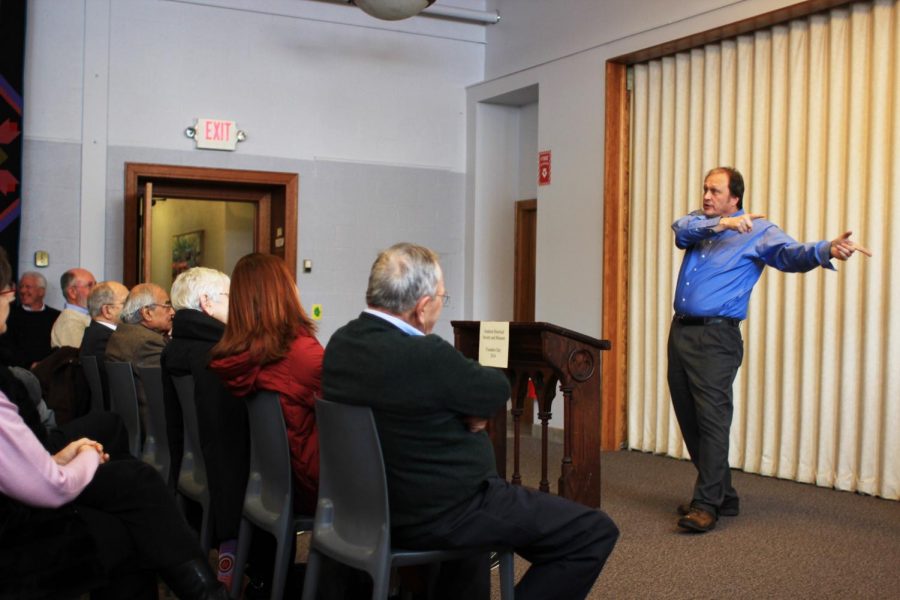At the Jan. 28 meeting of the Amherst Town Council, resolutions on education and Black History Month received unanimous support and the future of Amherst’s public schools and climate policy were discussed.
The first resolution of the meeting addressed the “Fund Our Future” campaign. This resolution was first passed in Dec. 2018 by the Amherst School Committee. Anastasia Ordonez, the chair of the Committee, spoke to the town council about the need for education funding in Amherst, citing a budget deficit of “hundreds of thousands annually.”
“Fund Our Future” is a grassroots campaign hoping to pass legislation to increase state funding for public education. Ordonez noted funding is currently determined by legislation known as the “foundation budget,” which hasn’t been updated since 1993, despite increasing costs in education.
The 2015 Foundation Budget Review Commission found that the Commonwealth of Massachusetts underfunds schools by more than $1 billion, according to a fact sheet included in the meeting packet.
Under current legislation efforts, Amherst could be eligible for approximately $264,000 a year depending on how the plan would be implemented, Ordonez said. The resolution was passed unanimously by the council.
The second resolution of the evening was not previously announced, but was voted on unanimously by the council. Read by Councilor Dorothy Pam of District 3, the resolution recognized February as Black History Month and named notable African-American citizens in Amherst and Massachusetts history, including Phyllis Wheatley, Edward Jones, W.E.B. Du Bois and Deval Patrick.
The resolution also commented on Massachusetts’ role in the slave trade, while simultaneously acknowledging Massachusetts became the first state to abolish slavery in 1783. A flag-raising ceremony in honor of Black History Month will be held in town on Feb. 3.
Alisa Brewer, councilor-at-large, was pleased with the resolution.
“The select board did this every year, and I’m glad to see it brought back this year,” Brewer said.
School superintendent Michael Morris and Ordonez led a presentation on a proposal for new construction on two elementary schools in Amherst.
“I think about the young kids, and what is our commitment to them. We need to be fiscally responsible,” Morris said. “We want to be conscious that there are other demands in town.”
In a letter included in the meeting packet, Amherst Pelham Education Association president Jean Fay wrote that the buildings of the Amherst public school system need greater attention.
“The aging ventilation systems are clogged with dust. Our bathrooms are not accessible for all students. Our bulletin boards are moldy. Problems with rodents found their way into our classrooms and our library, making discoveries of rodent droppings a common occurrence,” Fay wrote.
“Our ceilings are leaking, our doors are rusted to the point they need brute force to open, and our classrooms are either so cold we need to wear coats or so high into the 80’s that floors become dangerously slippery,” Fay added.
The council will continue to look into potential changes made to the Amherst Public School System, including renovations and possible new construction. In order to move forward, the council would be a continued process with the Massachusetts School Building Authority by April 12.
A motion developed by Councilor Darcy DuMont of District 5 and Councilor Evan Ross of District 4 called for the establishment of a standing Energy and Climate Action Committee under the Town Charter.
“Amherst needs to be taking bold action on climate and establishing itself as a municipal energy and climate leader,” the motion read.
The ECAC plans to report annually to the Council on progress toward climate action goals, measures taken to reduce emissions and build resilience, evaluation of the effectiveness and implementation of these measures and recommended funding needed to enable these initiatives.
“This document started as a collaboration between Councilor DuMont and myself,” Ross said. “I look forward to hearing from my colleagues…and incorporating their vision [if this passes].”
Regarding membership of the committee, councilors Stephen Schreiber of District 4 and Pam of District 3 concurred the resident members of the committee didn’t necessarily have to be experts in the environment.
Brewer added that including all different perspectives and different expertise was important, but noted that while setting precedent was important, it depended on what the council expected the group to bring back.
Schreiber responded that he didn’t believe citizens didn’t have to be experts, as long as they weren’t skeptics on the issue at hand.
“To me, [the list of expertise] is very slanted towards the STEM fields, and I think that we need to think beyond the STEM fields on this committee,” Schreiber said.
Councilor George Ryan from District 3 voiced similar concerns, requesting the requirements of expertise be less rigid to encourage more community members interested in energy and climate action to participate.
As a co-author of the charge, Ross commented that there is a need for expertise but that there also needs to be stakeholders to “ask those tough questions.”
Multiple proposals to modify the motion’s inclusion of expertise were defeated. By 10 p.m., several councilors voiced frustrations with the hour-long debate on the topic, while some suggested moving the motion back to committee.
Ultimately, 11 councilors voted in favor of the motion, which included language stating “some” of the residents on the committee should have expertise, while two voted against.
Town Manager Paul Bockelman provided a report to update the council on events in Amherst, including the recent Hampshire College announcement seeking a strategic partner moving forward. Bockelman noted Hampshire is a major landholder in the town and one of the largest employers.
The next council meeting will be held on Feb. 11.
Kathrine Esten can be reached at [email protected] and followed on Twitter at @KathrineEsten.




















